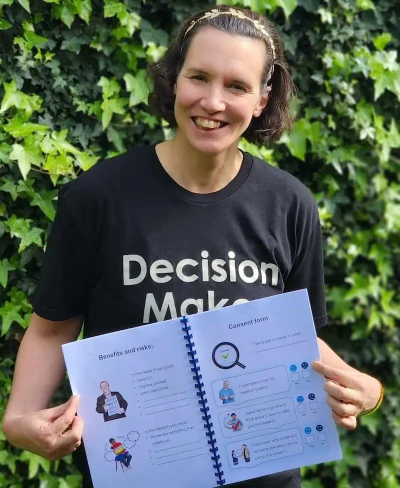 Dr Nicolina Newcombe, who is autistic, left school at 15 but returned to education through a second-chance program. Her experience highlighted the need for accessible adult literacy for learners with diverse needs, and now the PhD she completed at the University of Waikato is making academic research more accessible for people with intellectual disabilities.
Dr Nicolina Newcombe, who is autistic, left school at 15 but returned to education through a second-chance program. Her experience highlighted the need for accessible adult literacy for learners with diverse needs, and now the PhD she completed at the University of Waikato is making academic research more accessible for people with intellectual disabilities.
Nicolina’s PhD thesis is about adult literacy policies in New Zealand as they relate to people with intellectual disabilities. As part of this, she developed more than 70 pages of Easy Read research information, templates, and forms to enable people with intellectual disabilities to understand and fully participate in her academic research.
We’ve never heard what people with intellectual disabilities think about literacy and adult literacy education in New Zealand.
Dr Nicolina Newcombe
“My original research question was about adult literacy policies, but as I progressed, I realised I needed to make my own research more accessible to find the answer.”
She says she was also spurred on after witnessing the exclusion of a man with an intellectual disability from an open-entry tertiary education course.
I have the life I have because I had an open-entry chance to study at tertiary level and I wanted to explore what changes would promote better access to literacy and literacy education for people with intellectual disabilities.
Her research saw her work alongside five adults with intellectual disabilities, overseen by her lived experience advisor Glen Terry and under the supervision of Dr Sonja Ellis of the University of Waikato and Dr Gretchen Good of Massey University. A key outcome was the development of a series of Easy Read templates to enable her participants to understand and fully participate in her research.
Nicolina’s research has since caught the eye of Ethnic Research Aotearoa and People First New Zealand. People First has published her Research Consent Form Template in their Easy Read library and Ethnic Research Aotearoa has published it on their resources page. Now other researchers can use the Easy Read consent form to ensure people with intellectual disabilities can understand what a research project is about and decide if they want to take part in it.
“Interestingly, even Ethnic Research Aotearoa have picked up the Easy Read template suggesting it can be used more broadly for accessibility, not only for people with intellectual disabilities but for other communities where complex English is a barrier,” says Nicolina.
Nicolina says her completed PhD thesis includes other Easy Read templates for different stages of research and demonstrated how research findings can be communicated to people with intellectual disabilities.
Her PhD will be published in the University of Waikato’s Research Commons.
![[DO NOT USE] Professor Tom Roa, Photo Credit: Waikato Times](/assets/Uploads/News-and-events/News/2025/Professor-Tom-Roa.webp)


